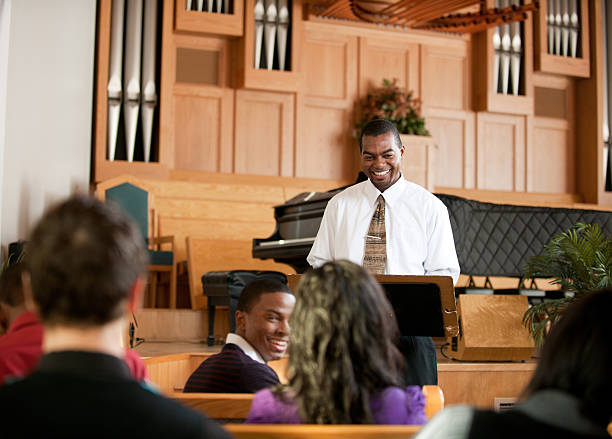(ThyBlackMan.com) Churches have more ways to connect with people than ever before. When used creatively, the utilization of digital conferencing, social media, and video chatting becomes an excellent means for spreading the gospel. This potentially increases membership numbers within the local church.
Total membership numbers have mistakenly become a metric for measuring success within a church. The focus must be redirected towards fellowship rather than numeric membership. One may ask, “what is the difference between fellowship and membership?” “Don’t they both occur on Sunday mornings?” Well, not exactly, this article first addresses the original establishment and the concept of fellowship within the church, followed by explaining the differences between membership and fellowship. These two terms are often interrelated but have far different meanings regarding the church. Lastly, we describe the advantages of establishing small group fellowship within the church to promote compassion, discipleship, education, encouragement, spiritual development and many more benefits, all of which equates to a greater fellowship experience. With all these stated advantages, why would we forsake the assembling of ourselves together?
The Establishment of the Church and the Concept of Fellowship
42 And they devoted themselves to the apostles’ teaching and the fellowship, to the breaking of bread and the prayers. 43 And awe came upon every soul, and many wonders and signs were being done through the apostles. 44 And all who believed were together and had all things in common. 45 And they were selling their possessions and belongings and distributing the proceeds to all, as any had need. 46 And day by day, attending the temple together and breaking bread in their homes, they received their food with glad and generous hearts, 47 praising God and having favor with all the people. And the Lord added to their number day by day those who were being saved.” (Acts 2:42-47)
The establishment of the first church was filled with the power of the Holy Spirit, reverence, and four principles: “Teaching”, “Fellowship”, “Breaking of Bread”, and “Prayer”.
“Teaching described the Apostles accounts of Jesus of Nazareth because they had been in the presence of the Messiah. The teachings included Jesus’ ministry, crucifixion, resurrection, and ascension. “Fellowship” means establishing close relationships with fellow Christians and more importantly developing spiritual intimacy with God. The meaning also included the sharing of goods in support of one another. “Breaking of Bread” described sharing a traditional meal and commemorating Jesus’ death and resurrection. “Prayer” meant communicating with God in homes and the temple.

It is important to know the church is not a building. It is an assembly of believers in Jesus Christ with the purpose of encouraging, worshipping, and teaching about the saving grace of Jesus. In present day, the “church” has come to mean the building where people meet, and the focus has shifted from fellowship to membership.
Fellowship vs. Membership
Let’s examine the differences between fellowship vs membership. The general dictionary meaning for fellowship is companionship; community of interest, activity, feeling or experience. Membership simply means the body of members of an organization. Fellowship is associated with an organism where all are a part of a living thing, whereas membership is associated with a manmade construct.
Acts 2:42-47 provides a template for distinguishing the New Testament church and helps differentiate the meaning of fellowship versus membership. Based upon the modern observation of both terms, we conclude that there is the possibility they may juxtapose one another today.
Every believer devoted themselves to the teachings of the apostles. There was a holy awe that overwhelmed everyone. According to the scripture in Acts 2, everyone was in “fellowship” as one body (organism) and they shared with one another whatever they had. However, by the time post-modern Christianity began to flourish in the United States, the concept of membership morphed into a form of hierarchy.
A high value on numeric membership has negatively impacted fellowship. It has spawned a dedication to the organization, rather than to God. Membership has created a mentality of self-centeredness, selfishness, privilege, arrogance, and organizational pride. An air of arrogance has contributed to a division between congregants as well as congregations. The desire of Christ to make his disciples one, in the 17th chapter of John, is, subtly, hindered by the cliques that have developed from membership mentality.
The fellowship among all believers must be characterized by a devoted concern that sacrificially seeks to promote the highest good of brothers and sisters in Christ. Fellowship calls us to befriend each other through the ups and downs, to be mindful and caring of one another.
Small Groups
God did not create us to live self-sufficient but to live in fellowship with each other. In Genesis 2:18, God tells us that it is not good for man to be alone. He created mankind so that we would need one another to survive. The original design of the church was of small groups meeting together in individual homes. Ministry should begin at home and our first small group ministry should be the family.
Small groups within the church are essential for spiritual development. They provide an environment where individuals can grow and mature spiritually through studying God’s word. Small groups may provide accountability partners where Christians can hold one another accountable, and a place where individuals are in the company of fellow like-minded Christians supporting one another. Commonly referred to as “iron sharpens iron, so one person sharpens another.” (Proverbs 27:17).
According to Outreach Magazine June 28, 2021; people who participate in small group fellowships serve more often, use their spiritual gifts more frequently, are more financially generous, readily share their faith, engage more intimately in prayer, and develop meaningful relationships with the group members. People who get involved, stay involved.
Conclusion
What happens if we forsake the assembly? We will start believing we are alone in our struggles. Without our church community, doubt, worry, and fear may eventually overtake us. Our faith will grow cold and the enthusiasm of our prayer-life and desire to continually seek God will become more distant. If we wish to hold to God’s unchanging hand, then we must remain connected to our church community. The benefits and blessings far outweigh the disadvantages.
Written by Rev. Dr. Larry E. Thompson, Rev. Dr. James A. Cobb, Rev Henry L. “Charlie” Sanders Jr, and Deacon Glenn Davis
















Brother, utter nonesense:
“Going to Temple” and attending Jesus’ Fellowship are completely different things. It is spiritually impossible to “go to church” because we “are” the Fellowship of Christ. King James for one intentionally had “Ekklesia,” Greek of the “Assembly-Called” out translated from the Old Norse, Kirkya, which was a physical place, and often with a shed-like shrine structure. It was an intentional misstranslation. There is either Fellowship in Christ or no Fellowship in Christ, for if Christians are gathered in his name, they are gathered in his name. Period.
This is Byzantine rubbish.